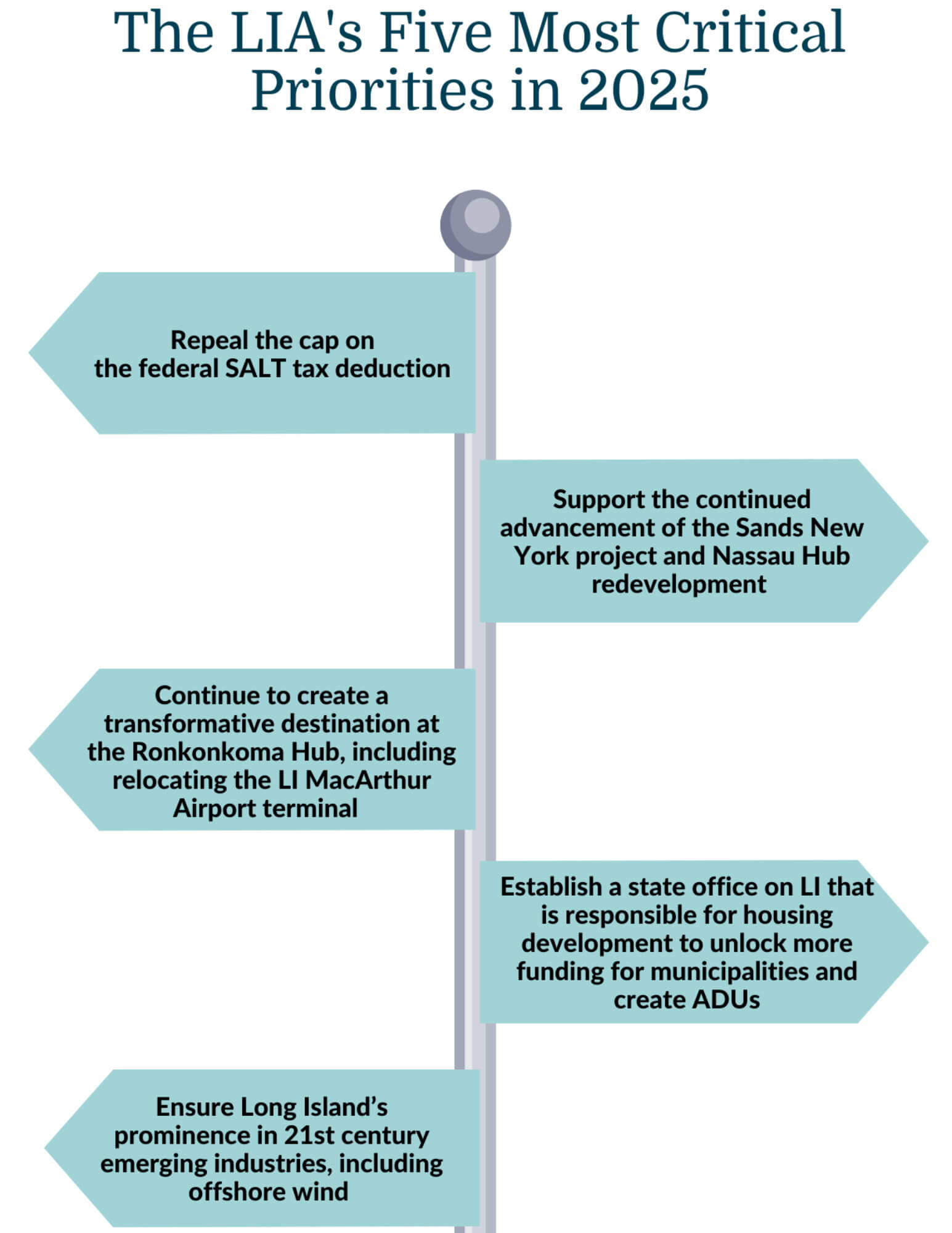LIA 2025 Policy Priorities
To view a PDF of the Long Island Association's 2025 Policy Priorities, click here.
Introduction
In 2025, Long Island is at a crossroads:
Policy decisions can either support our affordability and sustainability for the long-term future or continue to go down the rabbit hole of increasing costs, mandates, and regulations for our business community, stifling the economic potential of our region.
The Long Island Association (LIA) is non-partisan, and advocates for policies that cultivate business success.
We partner with elected officials who seek to solve our most pressing challenges and encourage investments and programs that result in an economic return for our region – including jobs and expansion of the private sector.
The LIA is confident all our elected representatives can work in a bipartisan matter to do what’s best for our economy.
The LIA will continue to ensure that our government officials are responsive to the needs of the business community, that our region receives an equitable share of funding, and that we stem the tide of New Yorkers leaving in droves.


The LIA’s 2025 policy roadmap is specific and direct, and if implemented would:
I. Address our region’s existential crisis of affordability, which is more acute on Long Island than other parts of the state and country.
II. Grow our businesses by allowing them to innovate and create jobs without being stifled by regulations.
III. Ensure the stability and modernization of our infrastructure while protecting our environment.
IV. Guarantee a bright future for all residents and businesses and ensure that Long Island continues to be an unparalleled place to live and work for future generations.
Let’s work together to guide our region, its businesses, and 2.9 million residents down the right path.
Long Island Quick Facts
Population
- Nassau County: 1,381,715 million
- Suffolk County: 1,523,170 million
- Total: 2,904,885 million, larger than 15 U.S. states
Source: U.S. Census
Median Property Taxes
- Nassau County: $10,000
- Suffolk County: $9,991
- Note: Both counties are in the top 12 in the entire country.
Source: Tax Foundation
Housing
- Median home price in Nassau County as of Nov. 2024: $775,000
- Median home price in Suffolk County as of Nov. 2024: $651,000
- 36% of Long Islanders spend 30% or more of their income on housing costs, the second highest in the state.
- From 2012 to 2022, Suffolk County’s housing units increased 2% and Nassau’s 2.7%, among the lowest of similarly sized counties in the entire country.
Sources: MLSLI OneKey, U.S. Department of Housing and Urban Development, Construction Coverage
GDP
- Nassau County: $100,089,673,000 billion, 5th in New York State
- Suffolk County: $105,751,656,000 billion, 6th in New York State
Source: U.S. Bureau of Economic Analysis
Small Businesses
- More than 80% of businesses on Long Island have fewer than ten employees.
Source: New York State Department of Labor
Domestic Migration
- Long Island has an overall domestic migration deficit because of people moving to other states. Nassau and Suffolk Counties lost more than 110,000 residents from 2017-2022 due to this domestic migration deficit.
Source: Long Island Association Research Institute


Taxes and Spending
- Advocate for a full repeal of the cap on the federal state and local tax deduction (SALT) and cut the corporate tax rate when the current federal tax package expires.
- Oppose new taxes and fees on the business community and residents from all levels of government and rein in unnecessary public spending.
- Support transformative economic development projects in our region that expand the tax base, including the Sands New York project at the Nassau Hub, the Belmont Park modernization, the mixed-use transit-oriented development at the Ronkonkoma Hub, and the Jake’s 58 Hotel and Casino expansion.
Housing
- Establish a Long Island office of the New York State Division of Homes and Community Renewal.
- Strongly encourage the adaptation of rules, regulations, and new funding to help municipalities create more accessory dwelling units (ADUs).
- Increase the state funding available to designated Pro-Housing Communities, including to support first-time homebuyers.
- Expand public-private partnerships to support workforce housing so regional businesses can attract and retain talent.
Child Care
- Support the Child Care Council of Suffolk and Nassau’s efforts to educate employers about creative ways to provide their workforce with child care options through the New York State Business Toolkit.
- Advocate for more public-private collaborations to provide child care, which includes cost sharing partnerships among government, employers, and employees.
- Enact new and sustainable investments in our child care workforce and infrastructure to ensure that safe, high-quality child care is available for all working families.
- Expand options for before- and after-care programs for school age children.
Energy
- Adjust goals for the state’s clean energy transition so they are reflective of the practicalities of ensuring affordability and reliability.
- Advance offshore wind and renewable energy projects in the federal and state approval pipelines. This includes Sunrise Wind and Empire Wind 1, as well as future projects in the New York Bight, because they will create thousands of family-sustaining jobs, billions in economic investment, and increase energy independence.
- Modernize the electric transmission and distribution system to improve reliability and integrate renewable energy while limiting cost impacts, including support of the Propel NY project.
- Oppose extended local moratoriums on battery storage development, which are critical to grid resilience, and ensure their safe operations.
Revitalization
- Continue to support zoning changes that foster revitalization of under-utilized and blighted areas.
- Implement statewide professional certification to expedite the municipal permitting process.
- Reduce the timeline for the SEQRA and local permitting processes.


Targeted Business Development
- Support tax credits, capital grants, and incentives through New York State Empire State Development, Industrial Development Agencies (IDAs), and other economic development entities on all levels of government, and resist efforts at the state level to reduce the impact of IDAs.
- Attract businesses in high-growth sectors from out-of-state to relocate to Long Island.
- Continue to support our small businesses, which comprise the majority of businesses on Long Island, as they navigate economic challenges so they can thrive.
- Boost Long Island’s tourism industry, a major economic driver.
- Implement the LIA’s East End Advocacy Agenda to grow the agriculture, aquaculture, and viniculture sectors.
- Leverage the economic opportunity of major global sporting events, including the 2025 Ryder Cup at Bethpage Black, the 2026 U.S. Golf Open at Shinnecock Hills, the 2026 NHL All-Star game at UBS Arena, the Belmont stakes when the Belmont Park modernization is complete, and secure future events.
Workforce Development
- Continue the LIA’s efforts to develop a regional workforce development strategy that focuses on attraction and retention of employees in high-growth industries including manufacturing in partnership with companies, not-for-profit organizations, school districts, technical schools, higher education, and government agencies.
Mandates
- Oppose the reinstatement of the federal “Beneficial Ownership Reporting” requirement that was recently struck down by a U.S. court.
- Oppose extended producer responsibility regulations that place undue burdens on businesses and negatively impact consumers.
- Oppose modifications to anti-trust, data privacy, wrongful death, and artificial intelligence statutes which would have negative consequences for many industry sectors, including small businesses.
- Oppose increasing the New York State prevailing wage and the implementation of a single-payer healthcare system.


Infrastructure
- Advocate for the Town of Islip’s process for moving the Long Island MacArthur Airport terminal to the north so it is adjacent to the LIRR Ronkonkoma Station and Ronkonkoma Hub, leveraging economic growth opportunities and as well as the potential for Amtrak to establish a station there.
- Ensure that the MTA 2025-2029 Capital Plan has funding for the Long Island Rail Road to expand and improve service, including on the East End.
- Redevelop Penn Station to increase ridership of Long Island commuters and unlock the economic benefit of more reverse commuters.
- Create a new Metropolitan Planning Organization exclusively focused on Nassau and Suffolk Counties to ensure our region’s fair share of road infrastructure funding.
- Ensure the continued development of New York State’s broadband network to underserved areas by streamlining the process and working in partnership with providers.
Environment
- Develop a regional waste management solution that is cost-efficient and sustainable.
- Support the swift implementation of the Suffolk County Water Quality Restoration Act to foster modern septic systems and expand sewers, while protecting water quality.
- Secure Long Island’s fair share of funding through the 2022 New York State Environmental Bond Act.


Education
- Continue to examine how Foundation Aid is provided to K-12 school districts so that it considers the cost of living in Nassau and Suffolk Counties to alleviate the property tax burden.
- Support federal and state education policies that increase achievement in our K-12 school districts.
- Streamline admission processes for BOCES technical education programs.
- Support our K-12 schools and colleges and universities as they train our next generation for high-demand fields and administer critical workforce development programs.
- Stimulate innovation and entrepreneurship in next-gen technologies including, but not limited to, biotech, clean energy, and artificial intelligence and support our region’s business incubator network and the not-for-profit Accelerate Long Island to create startups and new jobs.
Healthcare
- Address the financial viability of the region’s hospital systems by making significant, across-the-board Medicaid rate investments, since healthcare is the largest employer on Long Island and provides critical services to residents.
Inclusive Growth
- Support inclusive business practices, which strengthens the workforce by allowing for more innovation and perspectives and increases the bottom line.
- Support training and opportunities for minority, women, and veteran-owned businesses and business owners with disabilities to become more competitive in bidding processes.
- Cultivate a business environment that is tolerant and respectful of all groups, confronts discrimination, and embraces diversity.
Non-profit organizations
- Modify the region’s federal poverty limit formula to reflect Long Island’s higher cost of living.
- Sustain and expand federal and state programs so our region’s food bank network has additional resources to respond to food insecurity.
- Support organizations addressing homelessness, mental health, addiction, and health inequities on Long Island.
Public Safety
- Continue to maintain a safe environment for businesses by supporting law enforcement and stronger gun laws, as well as addressing human trafficking, drug abuse (including the opioid and fentanyl crises), hate crimes, gangs, and cyber threats.
- Advocate to amend discovery statutes and provide more resources to prosecutors.
- Further revise the 2020 bail reform laws to allow judges more discretion in considering public safety.




